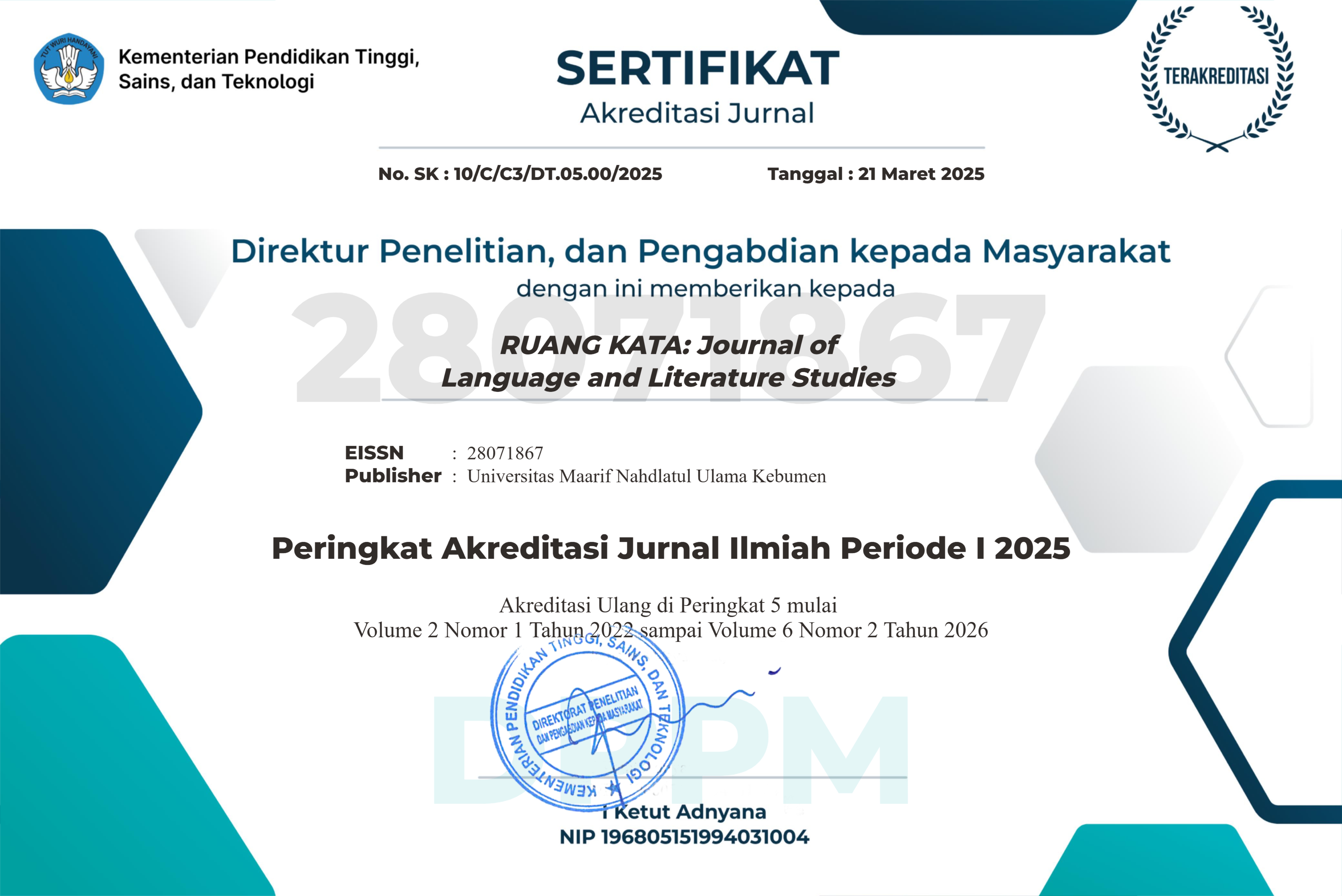Kritik Ekologi dalam Buku Kumpulan Puisi Selepas Musim Menjauh Karya Ahmad Sultoni
DOI:
https://doi.org/10.53863/jrk.v3i02.1031Keywords:
ecological criticism, poetry, literatureAbstract
This research aims to describe the forms of ecological criticism in the poetry collection Selepas Musim Menjauh by Ahmad Sultoni. This type of research is qualitative descriptive research with a literary ecology approach. This research data is in the form of words, sentences, phrases, or paragraphs that contain a form of ecological criticism. The data collection technique used in this research is the reading and note taking technique. The findings in this research show five forms of ecological criticism in the poetry collection book Selepas Musim Menjauh by Ahmad Sultoni, including: (1) criticism of land conversion, (2) criticism of environmental pollution, (3) criticism of climate change, (4) criticism of natural use, and (5) criticism of natural disasters. In this research, critical data on climate change is the most dominant. There are several titles that contain criticism of climate change, including: (a) Hari yang Tak Bermusim, (b) Kampung Halaman, (c) Suara Burung yang Murung, (d) Berjalan ke Barat Kembali ke Timur, (e) Desa-desa yang Tak Lagi Berkisah, (f) Tempat yang Dirahasiakan, and (g) Kamus Baru. Through ecological criticism it can be seen that the poet has sensitivity to environmental problems that arise around the poet. This can make readers aware that there are many environmental problems around the reader. It is hoped that readers can maintain the balance of nature, use nature wisely, and preserve nature for life in the future.
Key words: ecological criticism, poetry, literature
References
Anggarista, Randa. (2020). Kritik Ekologi dalam Kumpulan Cerpen Cemara Karya Hamsad Rangkuti. Jurnalis Trendi: Jurnal Linguistik, Sastra, dan Pendidikan, 5(1), 56-65. https://ejournal.unwmataram.ac.id/trendi/article/view/196/155
Aris, Qori Islami. (2020). Ekokritik Sastra dalam Puisi Talang di Langit Falastin Karya Dheni Kurnia. Jurnal Ilmu Budaya, 16(2), 98-109. https://journal.unilak.ac.id/index.php/jib/article/view/3703/1984
Azizah, R. N., & Marfina, E. (2023). Analisis Gaya Bahasa Kiasan dalam Kumpulan Puisi Ketika Rakyat Pergi Karya Wiji Thukul. Suara Bahasa: Jurnal Bahasa dan Sastra, 1(02), 103-116.
Endraswara, S. (2016). Ekokritik Sastra; Konsep, Teori, dan Terapan. Yogyakarta: Morfalingua.
Endraswara, S. (2016). Metodologi Penelitian Ekologi Sastra; Konsep, Langkah, dan Penerapan. Yogyakarta: CAPS.
Garrard, Greg. (2004). Ecocriticism. London and New York: Routledge.
Juanda, J. J. (2018). Eksplorasi Nilai Pendidikan Lingkungan Cerpen Daring Republika: Kajian Ekokritik. Jurnal Sosial Humaniora (JSH), 11(2), 67-81. https://iptek.its.ac.id/index.php/jsh/article/view/4331/3327
Keraf, A. Sonny. (2014). Filsafat Lingkungan Hidup. Yogyakarta: PT. Kanisius.
Moleong, Lexy J. 2017. Metodologi Penelitian Kualitatif, Remaja Rosdakarya. Bandung.
Oburumu, Agbeye. (2023). Exploring the Symbiosis of Nature and Culture in Caribbean Literature through Ecocritical Prims: Insights from De Lisser’s Jane’s Career and Selected Poems of Derek Walcott. International Journal of Research and Innovation in Social Science (IJRISS), 7(8), 1531-1537. https://www.researchgate.net/profile/Agbeye-Oburumu/publication/374166737_Exploring_the_Symbiosis_of_Nature_and_Culture_in_Caribbean_Literature_through_Ecocritical_Prisms_Insights_from_De_Lisser%27s_Jane%27s_Career_and_Selected_Poems_of_Derek_Walcott/links/6511fa682c6cfe2cc20ff6ed/Exploring-the-Symbiosis-of-Nature-and-Culture-in-Caribbean-Literature-through-Ecocritical-Prisms-Insights-from-De-Lissers-Janes-Career-and-Selected-Poems-of-Derek-Walcott.pdf
Ratna, Nyoman Kutha. (2015). Teori, Metode, dan Teknik Penelitian Sastra. Yogyakarta: Pustaka Pelajar.
Sugiyono. (2019). Metode Penelitian Kuantitatif Kualitatif. Bandung: Alfabeta.
Downloads
Published
How to Cite
Issue
Section
License
Copyright (c) 2023 Diana Fadila,Eko Sri Israhayu

This work is licensed under a Creative Commons Attribution-ShareAlike 4.0 International License.
Authors retain copyright and grant the journal right of first publication with the work simultaneously licensed under a Creative Commons Attribution-ShareAlike 4.0 International License that allows others to share the work with an acknowledgment of the work’s authorship and initial publication in this journal














